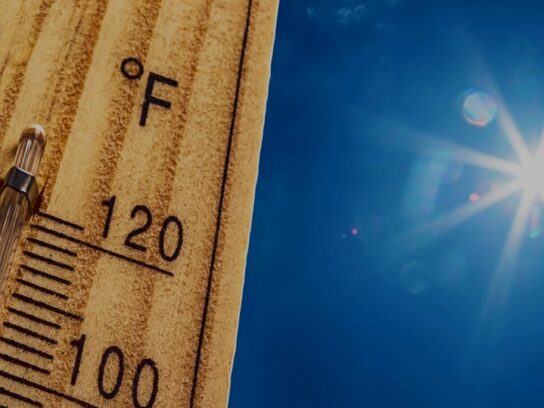
Temperatures are forecast to climb over 100 degrees this week. According to The Washington Post, the region could experience 100 degrees for the first time in 7 years.
Montgomery County’s Office of Emergency Management and Homeland Security declared a Heat Emergency Alert in effect from 11 a.m. Thursday through 9 p.m. Saturday. Here are 10 things the County wants residents to know to stay safe during a heat wave.
1) What is a heat emergency alert? The county declares a heat emergency alert when the temperature or heat index is forecast to be 105 degrees or higher for two days or more.
2) Why is the hot weather a concern? Exposure to extreme heat may result in heat-related emergencies, such as heat cramps, heat exhaustion, and heat stroke. Heat may also affect air quality, especially in urban areas. Poor air quality tends to impact the elderly, children, and sick persons.
3) What are the symptoms of heat-related illness? Painful muscle spasms or cramps, pale or flushed skin that may be damp or cool, dizziness, nausea, headache and weakness are symptoms of heat-exhaustion or early stage illness. In extreme cases, red, hot, dry skin, weak pulse, rapid breathing and changes in consciousness can occur, in which case residents should seek medical attention immediately by calling 9-1-1.
4) Where may people cool-off or get a break from the heat? County facilities, including libraries, swimming pools, recreation centers and senior centers are places to cool off during normal operating hours. Public locations such as indoor malls could also be utilized.
5) What can people do to avoid illness? Drink plenty of water during hot weather helps people avoid heat-related illness. The County Ride On buses provide free bottled water to bus riders during service hours.
6) What about persons without a home? Residents may stay in the homeless shelters 24/7 during a County hypothermia alert or heat emergency alert. Homeless persons may also utilize Progress Place facility in downtown Silver Spring. Residents with concerns about a homeless person may call the 24-hour Homeless Information Line at 240.907.2688.
7) How to report a concern about a pet or person? Residents concerned for the safety of a person or pet may call 301.279.8000.
8) Precautions to take during dangerously hot weather.
- Stay indoors whenever possible. Keep blinds or curtains closed to keep the inside cooler.
- Keep in mind: Electric fans may provide comfort, but when the temperature is in the high 90s, they may not prevent heat-related illness. Taking a cool shower or bath or moving to an air-conditioned place is a better way to cool off. Use the stove and oven less to maintain a cooler temperature.
- Avoid strenuous activities when outdoors. If you must do a strenuous activity outdoors, do it during the coolest part of the day, typically before 9 a.m.
- Take frequent breaks in a coold, shaded location when outdoors.
- Drink plenty f water. Illness may be caused by lack of hydration. Water is the best choice during hot weather.
- Avoid alcohol or caffeine.
- Wear proper protection from the sun when outdoors. Light-colored clothing, a hat, sunglasses and sunscreen are recommended.
- Never leave people or pets in a vehicle, even with the window open. It only takes a few minutes for the temperature inside parked cars to climb over 130 degrees.
- Monitor and frequently check on those at high risk. Those at greatest risk of heat-related illness are infants and children under four years of age, adults 65 years of age and older, sick persons, and overweight persons.
9) How serious is heat exposure? The CDC reports about 658 people die from extreme heat in the country each year. The County advises residents to get out of the heat, loosen any tight-fitting or heavy clothing and drink plenty of water if any of the following occurs:
- Heat cramps: symptoms include painful muscle spasms, usually involving the abdominal muscles or legs.
- Heat exhaustion: first signs are cool, moist, pale or flushed skin, dizziness, nausea, headache and weakness.
- Heat stroke: the most serious sign of overexposure. Symptoms include red, hot, dry skin, weak pulse, rapid breathing and changes in consciousness. Seek medical attention by calling 9-1-1.
10) Did you know? During a heat emergency it is illegal for pet owners to leave their pets unattended in vehicles or outdoors. The County will enforce Executive Regulation 17-17 which is also known as the Anti-Cruelty Conditions for Dogs and Other Pets. A fine of $500 is the penalty for this violation.


Comments are closed.